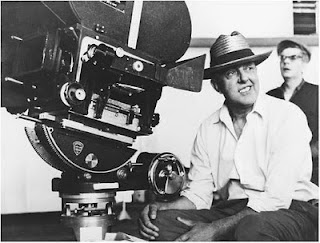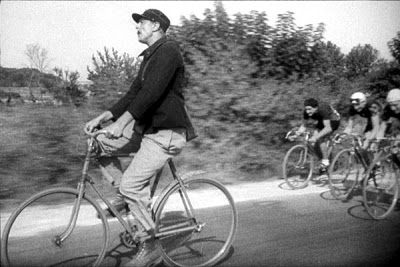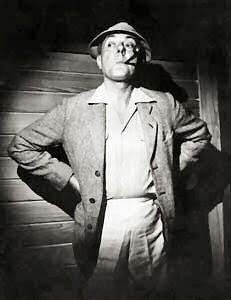As a performer, writer and director, Jacques Tati holds a very special place in the pantheon of great screen comedians.
Though he made only six feature-length films, his work stands alongside those of Chaplin and Keaton in terms of its timeless, universality and genius.
His gift for observational humor, combined with gentle satire, made his work both timeless and, at the same time, a trenchant observation about life in the industrialized 20th century.
In order to really understand what made Jacques Tati’s work so unique at the time he began directing his own films, one needs to look at the state of screen comedy in the late 40s and early 50s.
With many European countries recovering from the war, there was limited production, and many of the major films coming out of Europe at the time – at least those that garnered international attention – were serious films dealing with strong social issues: movies like THE BICYCLE THIEF (1949). Tati’s comic voice would speak to the changes taking place in post-war France through the language of pantomime.
In Hollywood, which during the silent era had been home to great writer-director clowns like Chaplin and Buster Keaton, had become increasingly restrictive in the amount of creative control delegated to performing talent. During the 30s, Stan Laurel had enjoyed relative creative control under producer Hal Roach, at whose studio he and Oliver Hardy made some of the best-loved comedies of all time. At the same time, at Paramount, W.C. Fields starred in a series of features that contained his distinct comic signature.
But by the 40s, comedy was in the hands of comedians culled from radio – Abbott and Costello, Bob Hope, Red Skelton, among others – whose material came almost entirely from gag writers and whose films were very much a studio product, bearing none of the distinct, personal style of Chaplin and Keaton or even of Fields and Laurel & Hardy. Only Jerry Lewis, working with partner Dean Martin in films for Paramount, would begin to wrest back creative control from the studio system, but this was still a good decade in the future in the late 40s.
Jacques Tati, a former music hall clown, entered films initially appearing in a series of short films built around his stage routines, and subsequently began acting in films in supporting roles. But in 1949, he wrote, directed and starred in his first feature-length film, JOUR DE FETE, which immediately established Tati as a major new creative force in screen comedy.
The story of a simple French postman who becomes determined to compete with the American postal service’s need for speed, Tati’s “Francoise” character was one he had played on-screen before, in the short film “The School for Postmen”. JOUR DE FETE essentially built upon this premise and expanded it with the events of a big carnival taking place in the small town in which all of Tati’s characters inhabit.
With this film, Tati demonstrated that it was still possible for a comedian to write, direct and star in his own film, which would reflect the clown’s unique sensibilities, cinematic style, and characteristic humor within a unified narrative film.
Tati’s next film would prove to be even more successful on an international level, and would establish the screen character for which he would forever be remembered: Mr. Hulot.
Released in 1953, MR. HULOT’S HOLIDAY is a deceptively simple film about a group of characters gathered at a seaside resort, where the constant comings-and-goings of the different people, animals, and cars makes for anything but a relaxing getaway.
Into this setting comes Mr. Hulot, eternally baffled and perplexed by the world around him, and a frequent victim of misunderstanding.
MR. HULOT’S HOLIDAY combined elements of satire with the grace and physical slapstick of the great silent clowns. Tati’s “Hulot” character contained something of Buster Keaton’s bewilderment of the world around him, combined with that comedian’s sense of inquisitiveness and calm acceptance. HULOT’S HOLIDAY is less a satire on the modern world than Tati’s later work, but still kids the middle-class French vacationers who come to the seaside seeking rest and relaxation, and end up encountering anything but.
Tati’s next film, MON ONCLE, was released five years later to great acclaim. Unlike HOLIDAY, MON ONCLE took place in a modern, urban Paris, where Tati focuses on a middle-class family surrounded by complicated gadgets ostensibly designed to make their busy lives a little easier. Of course, the technology only serves to complicate things further. Tati, once again playing Mr. Hulot, gets a job at his brother-in-law’s factory, where he proceeds to wreak havoc.
Like HOLIDAY, MON ONCLE was an extremely methodically-paced and carefully constructed comedy. It contained even stronger elements of social satire, and in many ways remains Tati’s most successful film in terms of how he combines the old world simplicity of his Hulot character with the frenzied, chaotic modern life of his sister’s family. The film has inspired filmmakers from Terry Jones to David Lynch.
If MON ONCLE kidded modern society, PLAYTIME – Tati’s next film – skewered it. Released a whole nine years after MON ONCLE, in 1967, PLAYTIME is probably Tati’s masterpiece. He shot the film on a large-scale set representing Paris (dubbed “Tativille”), and the extraordinary costs of production, with the inordinately long shooting schedule, bankrupted Tati.
The film itself is clearly a work of genius. The scale, unprecedented for a comedy, captures in fine detail the misadventures of a group of American tourists in Paris, from their hectic arrival at the airport to their departure by bus the next morning. Amidst all this chaos is Mr. Hulot, who is trying to keep an appointment with a representative at a large company, in whose office building Hulot becomes hopelessly lost.
The film was truly a comedy epic; originally released at 155 minutes, the film would subsequently be re-cut to 126 minutes, then to 108 minutes. It is the 126 minute version that has been restored today, and released on the DVD format.
In the wake of the bankruptcy of Tati’s production company following the release of PLAYTIME, his final two projects would be much smaller in scale. TRAFFIC, released in 1971, had Hulot traveling to an auto show and encountering every conceivable obstacle along the way. The film harkens back to MON ONCLE in its contrast of simple, rural life with the frenzied pace of modern technology. While the film contains a number of memorable gags, it is overall a lesser effort than the three films that preceded it. While Tati was still an artist working at the height of his creativity, the financial hit he took from PLAYTIME affected the scale on which he could execute his comic sequences.
Tati’s swan song was PARADE, made for Swedish television in 1974. It amounted to little more than a filmed music hall sketch, with the audience active participants in the series of acts that come across the stage. Tati himself is a sort of master of ceremonies, and the film is an excellent opportunity to see some of the sketches that earned him acclaim early in his career.
PARADE was a fitting farewell to this master comedian. While not a work of high cinematic dexterity, it nonetheless served as a recording of the comedian in his golden years, still able to command the attention of his audience and rock them with laughter.
Tati himself died in 1982, but his legacy, and his character of Mr. Hulot, lives on – his work inspiring current day comedians, such as Rowan Atkinson (who paid tribute to Tati with his film MR. BEAN’S HOLIDAY in 2007), and most recently, through the animated film THE ILLUSIONIST (2010), which was adapted from an unproduced script by Tati (and featured an animated likeness of the Hulot character in the lead role).
The continued interest in Tati and his work is a testament to his ability to convey so much about the human experience – while making it side-splittingly funny.












































































































